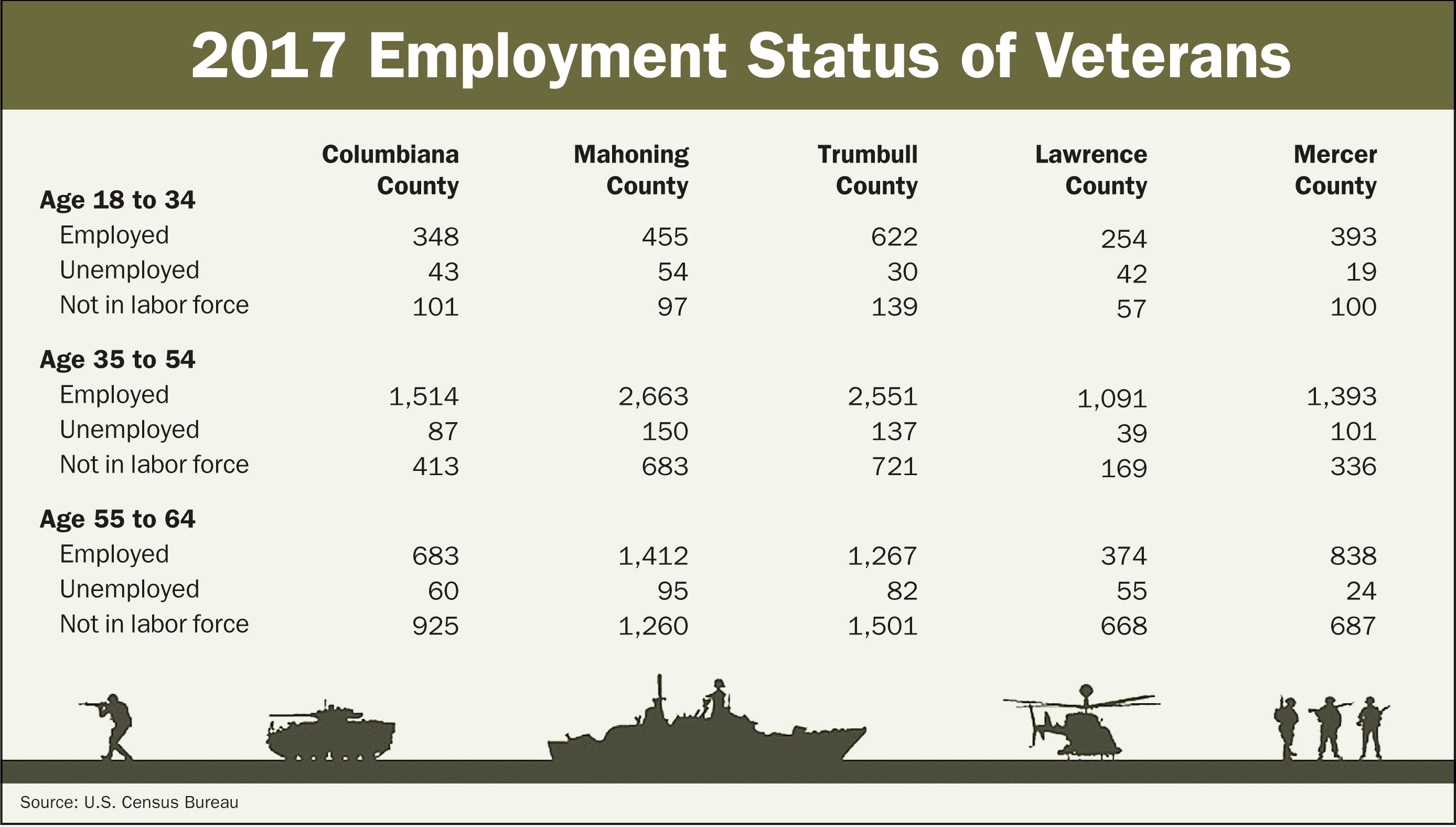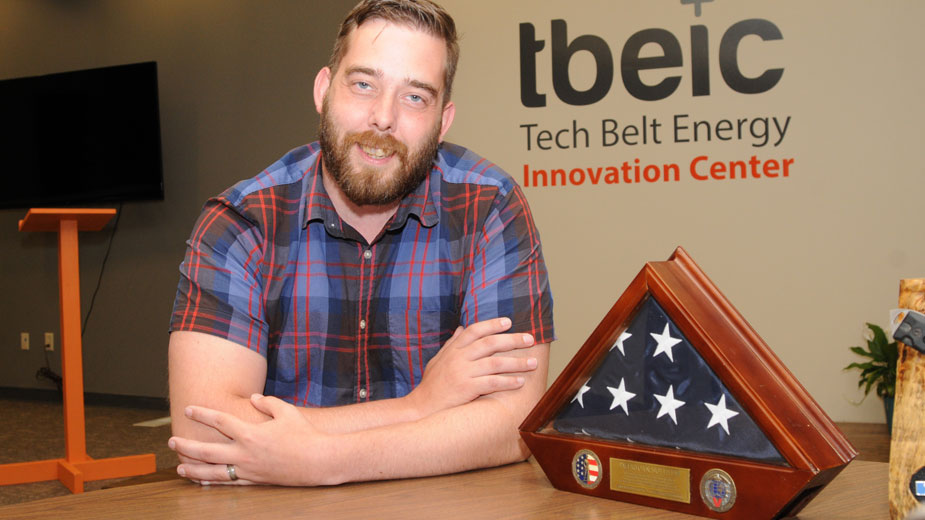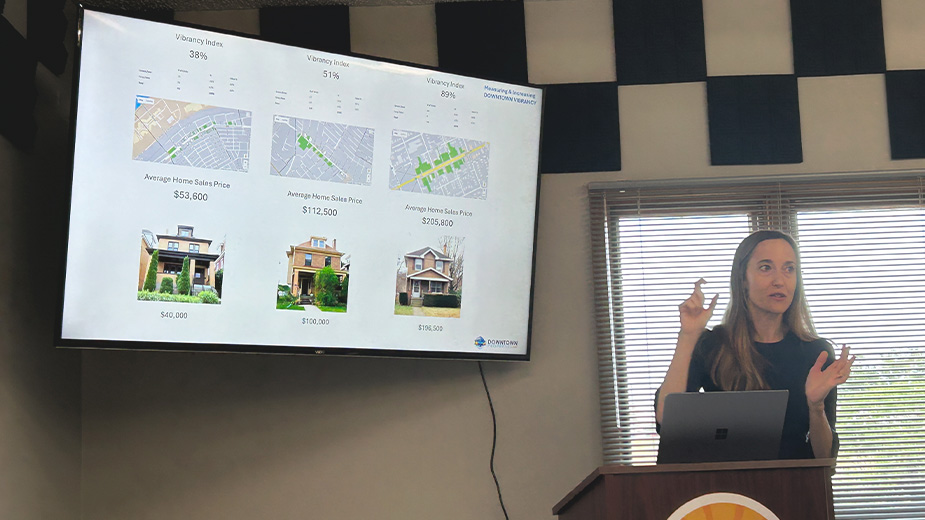Vets Bring Home Leadership Skills
YOUNGSTOWN, Ohio — Developing and strengthening the team at the Tech Belt Energy Innovation Center in Warren isn’t the same as leading patrols along the border of Kosovo and Serbia, but Rick Stockburger, president and CEO of TBEIC, says he wouldn’t be able to do his job today if not for his military experience.
Stockburger joined the Ohio Army National Guard just after 9/11 and served for seven years in its infantry. His experience took him to Kosovo for 18 months in 2006, where he was the youngest ranking squad leader at the time to lead the patrols. From 2009 to 2010, he was deployed to train Hungarian special forces, after which he went to Afghanistan where he was a combat mentor for the Afghan National Army special forces.
After he retired from the military in 2010, Stockburger had difficulty transitioning back to civilian life, he says. He was suffering from post-traumatic stress disorder from frequently being in combat situations, as well as some physical ailments.
“Not a lot of folks have seen combat,” he says. “Once you get out, people don’t understand what you’ve gone through. As much as everybody says ‘Thank you for your service,’ they don’t really know what that’s like.”
While Stockburger’s experience led to those issues, it also prepared him for life after the military, he says. In order to lead the missions in Kosovo, a general had to sign off on Stockburger’s ability to do so, and some of those in his party outranked him.
“I had to learn to work with folks who were older than me and more experienced, and build trust that I was going to make sound decisions in their best interest,” he says. “And that is a really tough thing to do.”

He learned leadership skills from mentors during his time in Iraq and Afghanistan who “consistently pushed me and pulled me back,” he says, and gave him the confidence to be a leader.
“Those are the folks who built me up and tore me down just enough that I was able to learn,” he says. It’s that style of leading that Stockburger brings in his role at TBEIC. “I let our team explore their limits. They’re always pushing to do more,” he says.
The military grooms its members in essentially the same way, explains Vern Richberg, business counselor with the Minority Business Assistance Center at the Youngstown Business Incubator. The military identifies the “gifts and talents of ordinary people” and develops them toward the accomplishing of a mission, says Richberg, a 20-year veteran of the Air Force.
“One of the things that the military does best across the board is helping individuals hone their skill sets to contribute to a much larger picture or mission,” he observes.
Richberg, a graduate of the Air Force’s Airman Leadership School, says the education he received there is “very instrumental in who I am today.” He put those skills to use for nearly nine years as an airbase leader for an emergency response team at Eglin Air Force Base in Florida.
The Air Force also took steps to ensure a smooth transition to the civilian workforce, he says. By putting “deliberateness and intention” behind helping people identify and develop their transferable skills, its puts them in a better position to transition to the civilian sector. It’s a “huge uplift for employers,” he says, particularly in the manufacturing sector, where veterans take jobs after working on multimillion-dollar pieces of equipment.
“Where else can you get the kind of skilled labor that the military produces?” Richberg says. “A vast majority of Fortune 500 companies 15 years ago were led by men and women with previous military experience.”
Developing leadership skills at all levels of the military is important because anyone might need to take up a leadership position at a moment’s notice “and make hard decisions quickly,” says TBEIC’s Stockburger. While serving, he had to know the jobs of people two levels above and below, he says. In the civilian world, it makes veterans more adept to handling stressful situations, he says.
“People think the military has an extremely top-down leadership structure; you have to be a cog in the machine,” Stockburger says. “I never felt like a cog in the machine.”

It also requires excellent communication skills, he says. During deployment, Stockburger had to learn how to communicate with Afghan soldiers through a Hungarian interpreter, which “is a feat.”
Being able to relay what you want to relay to the right person at the right time is 95% of effective communication, he says, and is critical in determining whether a mission is successful or a failure.
At the New Castle School of Trades’ East Liverpool campus, three instructors use communication and technical skills gained in the military in the classroom.
Ray Betteridge, an industrial maintenance instructor and Air Force veteran, educates his students on attention to detail, communication, accountability and the importance of appearance and attendance, says the school’s director, Jim Buttermore. “All these attributes are shared with students on a daily basis,” he says.
Wendell Keyser, HVAC instructor and Air Force veteran, credits the military as the source of his self-discipline, work ethic, leadership abilities and sense of duty, Buttermore says. He instructs students on the mechanical skills he gained as an aircraft mechanic and crew chief on reciprocating engine aircraft.
As a lieutenant in the Navy as well as executive officer for her unit, Janice Hanna was responsible for the evaluation of all officers and enlisted personnel, coordinating the training and education of those enlisted and supervising records retention.
Those skills are critical to her work as the director of education and general education instructor at NCST’s East Liverpool campus, Buttermore says.
“These veterans find that their experiences in the military are vital to the assistance they give to students who are transitioning from military to civilian life,” he notes. “Veterans are able to utilize VA educational benefits to enroll in classes at New Castle School of Trades, where they learn the skills necessary to secure employment upon entering civilian life.”
The YBI also has a “deliberate interest” in helping veterans connect with resources available to them, Richberg says. He works directly with veterans as a business adviser “to help give them a competitive advantage,” he says, with marketing, financials, operational management and hiring.
While veterans face the same uphill climb as any entrepreneur, their experience creates an inherent understanding that any organization has many different components and they can recognize where they fit in any equation, he says.
Bringing that kind of understanding to the table as an entrepreneur or small-business owner makes them more adept at critical thinking and organization, “so they can create more sustainable businesses,” Richberg says.
“And America benefits from that.”
Pictured above: The military gave Rick Stockburger the confidence to lead at TBEIC, he says.
Copyright 2024 The Business Journal, Youngstown, Ohio.



